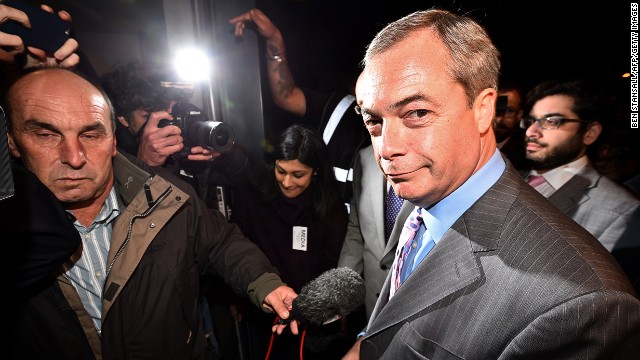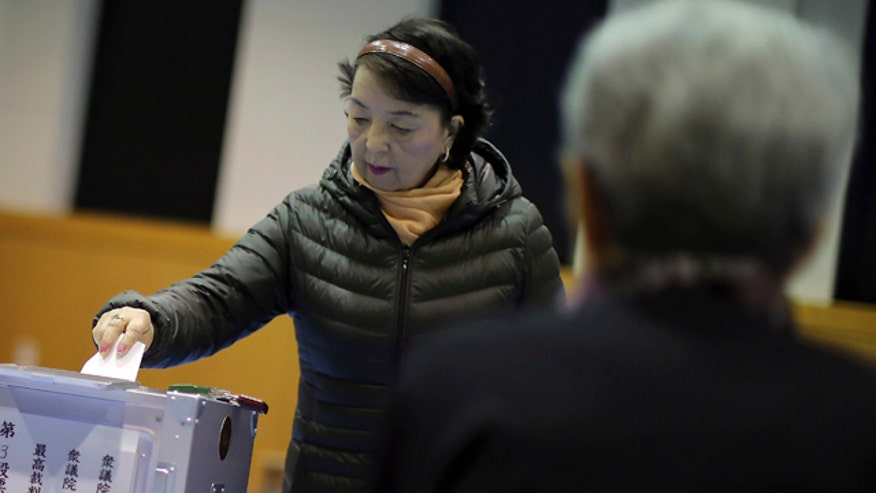UK Independence Party's by-election win throws Britain into political abyss
By Robin Oakley, Special to CNN
November 21, 2014 -- Updated 1224 GMT (2024 HKT)
 |
| UKIP's Nigel Farage will be reveling in his party's triumph and redoubling efforts to win over Euroskeptic Tories. |
Editor's note: Robin
Oakley was political editor and columnist for The Times newspaper in
London from 1986 to 1992, the BBC's political editor from 1992 to 2000,
and CNN's European Political Editor between 2000 and 2008. The opinions
expressed in this commentary are solely his.
(CNN) -- The UK Independence Party, led by the
pub-clubbable Nigel Farage, has won a resounding second successive
Parliamentary by-election and sent British politics tumbling into an
abyss of the unknown.
Mark Reckless, the former
Conservative politician who left the party for UKIP in September, won
back his seat in Parliament Thursday in the Rochester and Strood
by-election that was triggered by his defection.
UKIP is now more than
just a fringe group thumbing its nose at the big parties: it is a wild
card which can threaten all their prospects.
Few political experts
would claim at this moment to be able to predict the outcome of the next
General Election, which will take place on May 7, 2015. And nobody
knows how many of the protest votes UKIP has been gathering will stay
with them when voters are deciding who will govern the country.
But UKIP are still
advancing: back in May, they won the European Parliamentary elections
with 27 percent of the votes and 24 seats, the first time a party other
than Labour or the Conservatives has done so.
What seems almost
inevitable is that there will be another "hung" Parliament after the
General Election -- meaning no party will win an outright majority of
seats. But this time neither Conservatives nor Labour look like being
able to build a coalition government without doing deals with more than
one other political grouping.
Britain is likely to
experience an unstable era of Scandinavian-style politics where the
chief preoccupation of the political class is not solving the problems
of the nation, but putting together deals to enable any decisions to be
taken at all.
Reckless was the second
former Tory to resign his seat and win his way back to Parliament in the
purple colors of UKIP after Douglas Carswell had done the same in
Clacton in October. And although his roughly 3,000 vote majority will be
less sustainable at a General Election than Carswell's crushing
victory, it keeps UKIP on track for its ambition of winning enough seats
next May to hold the balance of power.
In Rochester, UKIP
managed to resist a huge Conservative campaign that included five visits
from Prime Minister David Cameron, who was desperate to stave off
another UKIP victory that could call his effectiveness as the leader of
the Tories into question.
UKIP also won over a
significant proportion of the former working class Labour vote -- aided
by a Labour front-bencher's online posting of a photo of a house in
Rochester draped in English flags with a white van in the driveway.
Politicians of all stripes were quick to pounce on Shadow Attorney
General Emily Thornberry's ill-judged tweet as snobbish and derogatory, and Thornberry resigned her position before the night was over.
UKIP also reduced the
Liberal Democrat vote to a derisory figure: some of their former protest
votes on the Left are now going to the Green Party.
The UKIP bandwagon is
still rolling. Reckless was a confused candidate who at one stage was
slapped down by Nigel Farage for suggesting that EU immigrants might be
sent home, but the party that secured a mere three percent at the last
General Election in Britain has become a significant political player.
It is now the obvious
receptacle for protest votes in the way that the Liberal Democrats used
to be. But their participation in a coalition government with the
Conservatives has shredded the Lib-Dems' political appeal.
UKIP has successfully
harnessed to its bandwagon to the common feeling of disillusion with the
two major parties and the Westminster "establishment." As well as its
anti-European stance, it has profited from bringing immigration to the
fore as a political issue.
This has spooked
lawmakers in other parties who have demanded that their own party
leaders must also get tougher on immigration -- a policy area on which
few deal in facts but on which much emotion is expended. But the more
that Labour and the Tories rush out new immigration policies, the more
the public say: "We thought you told us that UKIP were a bunch of
fruitcakes, but now you are agreeing they were right all along."
Political strategists
used to believe that UKIP were chiefly a threat to the Conservatives,
taking the votes of right-wing Euroskeptics away from them. But in the
recent Heywood and Middleton by-election in the greater Manchester area
UKIP came within a few hundred votes of grabbing a Labour seat too.
With the resurgent
Scottish National Party threatening to grab 30 of Labour's 40 Scottish
seats in the Westminster Parliament, and Labour's leader Ed Miliband
proving the lowest-rated occupant of his position in polling history,
Labour too are shivering at the UKIP intervention.
So where do we go from
here? UKIP will revel in its triumph and redouble its efforts to entice
more Euroskeptic Conservative MPs to jump ship in order to save their
seats at the next election.
David Cameron, his
authority badly dented after he promised to throw the kitchen sink at
saving the Rochester seat, will be under massive pressure from his MPs
to turn the political tide now with the major speech he has for some
time been promising on immigration (and which he postponed for fear of
having the Rochester result taken as a verdict on his efforts).
He is handicapped
because the Conservatives' pledge to reduce immigration to less than
100,000 a year has failed because of the EU's commitment to the free
movement of people within its borders, and German Chancellor Angela
Merkel is heading Europe's refusal to reconsider that principle. That
again plays into UKIP's hands.
Right-wing Euroskeptic
Conservative MPs insist that their party and UKIP are part of the same
political family, and they will now try to pressure Cameron into some
sort of electoral pact -- arguing that otherwise Labour will "win" next
May's election with less than a third of the votes.
Cameron will resist, but
the irony for UKIP is that of all the possible election results, the
only one that will bring about their chief political aim -- an in/out
vote on Britain's membership in the European Union -- is victory for the
Conservatives who have promised that referendum.
The opinions expressed in this commentary are solely those of the author.

























